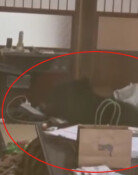[Editorial] Mindful of Elections?
As a result of discontent of urban Seoul residents with the administrative capital relocation, the ruling party and Ministries are coming up with development plans for the metropolitan area. Mindful of next months by-elections, next years local elections, and the presidential election, the politicians are trying to appease metropolitan residents with development plans, much as they tried to appease Chungcheong province residents with similar development plans. The plans for Seoul, though, seem to be largely at odds with the goal of resolving overpopulation in the metropolitan area. The consistency of territory development plans is questionable, according to government critics.
Kim Han-gil, the chairman of the special committee for Metropolitan Area Development, recently announced a plan to relocate the Seoul Airport of Seongnam city. The airport is South Koreas northernmost air base and defends the Seoul metropolitan area since it is poised to block surprise attacks by North Korea. As expected, the Defense Ministry immediately responded to the announcement, saying that it had no plan to relocate the airport. Critics claim that it was careless to announce the relocation plan without previous consultations with the Defense Ministry, since the airport is a national security issue. Building a new city at the site of 1.2 million pyeong Seoul Airport is also an issue of urban planning, real estate policy, environment and transportation.
The Ministry of Education and Human Resources Development also announced a plan to build universities and increase the number of freshmen in the metropolitan area. Currently, there seems to be no basic principle in education policies to increase school populations. Meanwhile, the residents of Gwacheon city are in a state of agitation as the government has not come up with countermeasures to the citys expected depopulation once the government offices move to the new administrative capital.
It is surely crucial to improve competitiveness of the economic center, the metropolitan area, to encourage stable growth of national economy. Building high tech plants - such as semi conductor and electronic appliance plants - in a metropolitan area where infrastructure is established and human resources are available is one way to increase economic competitiveness. However, critics of the current government point out that if poorly thought-out policies are implemented to appease citizens for short-term political gains, it is citizens who will have to bear any future effects of the projects. Without a developed blueprint for national territory development, the effects of hasty plans may hurt the economy in the long term. Many government observers note that relocation of the administrative capital should be reviewed and implemented with a long term perspective, taking both the post-unification era and national competitiveness into consideration before finalizing any plans.







